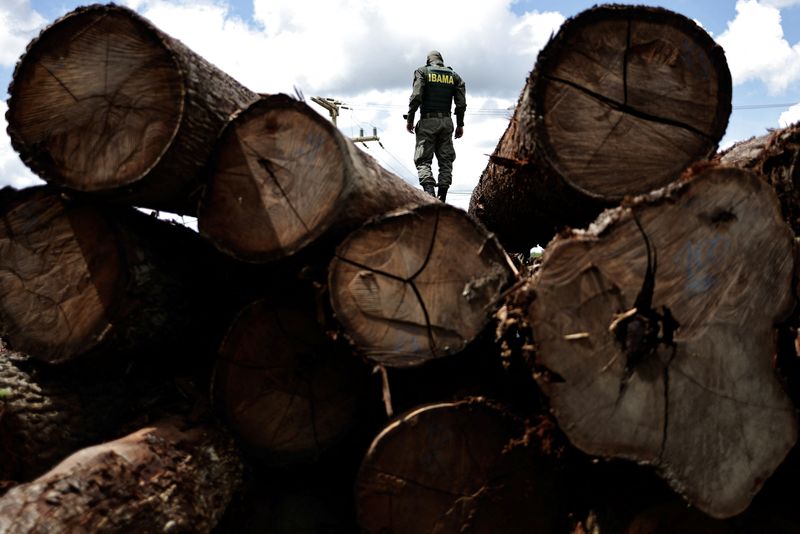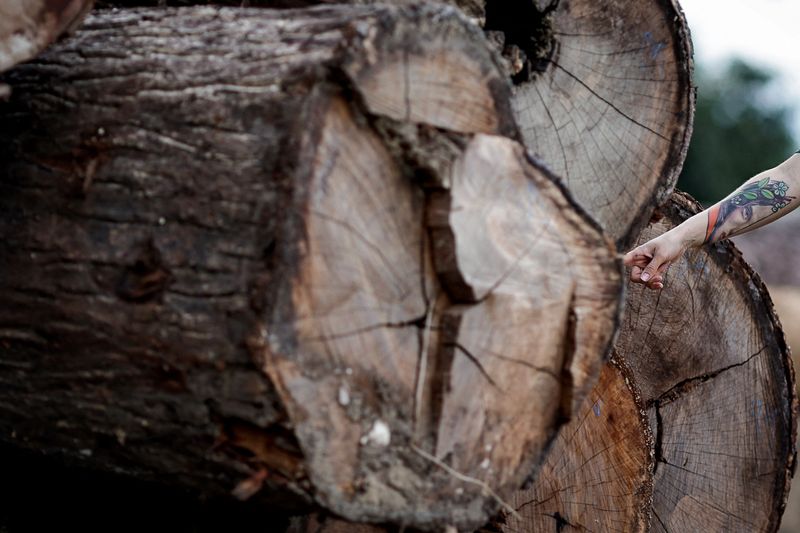By Jake Spring
URUARA, Brazil (Reuters) - Brazil's environmental enforcement agents set out in January on their first mission this year to combat illegal deforestation, with renewed energy after the election of a president who has promised to stop surging Amazon (NASDAQ:AMZN) rainforest destruction.
But, after years of dwindling funding and staff at the environmental agency Ibama under former far-right president Jair Bolsonaro, only two of the 12 agents on the mission near the town of Uruara had any experience with field operations.
Their helicopters were out of action for maintenance so they had to travel by truck, bumping over 200 kilometers (125 miles)of rough dirt roads to visit five deforested areas in 12 hours. On one site, it appeared loggers had left minutes before Ibama arrived, likely warned by lookouts along the roadway, the agents said.
"We were working with the minimum, both for human resources and equipment," said Givanildo dos Santos Lima, the Ibama mission's leader. With helicopters, the same work would have taken 2 hours and the agents would have retained the element of surprise, he said.
President Luiz Inacio Lula da Silva, who took office Jan. 1, has vowed to end destruction of the world's largest rainforest but it may take years to show major progress, as understaffed agencies face a bureaucratic battle to hire staff and a violent one against criminals emboldened by his predecessor.
Lula has drawn global acclaim for his ambitious conservation targets. The sharp contrast with Bolsonaro, who criticized environmental agents, was a relief to some scientists concerned that the retreating Amazon rainforest may be near a point of no return.
However, the world is unlikely to see much progress in the battle to defend the Amazon until 2024 at the earliest, according to interviews with nine current and former government officials.
Rapidly falling forest until then would continue to release vast amounts of carbon dioxide, driving climate change, environmentalists say. The rainforest was cleared at a rate of about three football fields per minute in 2022, 54% faster than the year before Bolsonaro assumed office, according to government data.
BOOTS ON THE GROUND?
Brazil's most powerful weapon against deforestation in the short run is Ibama, which slaps fines on offenders, bans farming in deforested areas and destroys expensive equipment used in illegal logging.
Ibama's staffing and resources expanded in Lula's 2003-2010 presidency, when he managed to reduce Amazon deforestation by 72%. But its numbers have dwindled dramatically since then.
Rodrigo Agostinho, whom Lula tapped to run Ibama, told Reuters in an interview that the agency now has about 350 active field agents for all of Brazil. That is less than half what it had at the start of Bolsonaro's term and well below the 2,000 field agents at the peak of its powers, he added.
"That number is entirely insufficient for stopping environmental crimes," said Agostinho. "The prospect for getting back that staff is quite challenging."
Agostinho said the government will open a call for new Ibama hires by early April, but it is likely to then take 10 months before new agents are in the field, due to rules about public-sector hiring and training for such dangerous missions.
The incoming Ibama chief was circumspect about how many agents could be hired this year, calling it a "gradual" process.
"We will reduce deforestation indicators, but we know that it will take a certain amount of time," he said.
IN THE SHADOW OF VIOLENCE
As Reuters accompanied Ibama's first anti-deforestation missions under Lula in January in Northern Brazil's state of Para, the tough task facing the agency was clear.
Many of Ibama's veteran field agents retired or left in frustration over the past four years, given restrictions on their jobs under Bolsonaro, who had obstructed their main enforcement tool of environmental fines and sought to limit their destruction of illegal mining and logging equipment.
Bolsonaro had called for more farming and mining on protected lands, arguing that it would lift the Amazon region out of poverty. A lawyer for Bolsonaro, who is currently residing in Florida, did not respond to request for comment.
Sidelining Ibama, Bolsonaro deployed the military to protect the Amazon, but their inexperience in conservation failed to lower deforestation while running up a massive bill.
Environmental criminals also ran rampant, according to Lima, the leader of the January mission. On a similar mission three years ago, Lima was surrounded by an angry mob after he apprehended a flatbed truck hauling a load of suspect timber.
One man hit him with a bottle in the face: a video of the incident seen by Reuters showed blood streaming from his temple. He got three stitches at a local hospital.
On a 2021 mission in Rondonia state, an informant forwarded Lima messages from a local chat group, referring to an Ibama agent of his description raiding sawmills.
"Now there is an opportunity to kill him, just say the word," said one message in the group, reviewed by Reuters.
In December last year, federal police said they had conducted raids into an alleged logging ring suspected of making a death threat against an Ibama agent, identified by Lima as him. No arrests have been made and federal police did not respond to request for comment on the case.
"People are more heavily armed, which escalates violence," Lima said, highlighting the need for stronger police escorts on the agency's missions. "The violence will be worse."
While other agents and environmental officials expressed similar fears, Agostinho said he did not expect rising violence but rather a "pacification" of criminal elements.
Ultimately, Lima and several other Ibama agents told Reuters, the agency needs far more people and equipment to control deforestation, rather than merely displace it.
"You squeeze one frontier of deforestation and so they move to another region," said David Belshoff, another agent on the mission. "You need logistics to have other teams in place to fight them wherever they start."
RESOURCES ON THE WAY
Lula has already begun marshaling more resources for Ibama. His transition team cut a deal with Congress in December to double the agency's enforcement budget from last year to 362 million reais ($71 million) this year.
Sister agency ICMBio, which oversees national parks, saw its funding to protect the reserves rise 55% after Lula's budget deal, government data shows, but staff levels there are even more stretched. ICMBio said it had 1,367 vacant positions and was aiming to start hiring this year, including calling up people who took an entry exam in prior years.
"Environmental enforcement efforts, which are already underway, aim to gradually reduce deforestation within federal reserves, both in 2023 and in 2024," ICMBio's press office said in a statement, adding that Lula also intended to create more reserves.
The new government has set up a special Ibama task force to investigate fraud in the timber trade and rescinded a Bolsonaro-era system making it harder to collect environmental fines.
Ibama has been empowered again to choose the targets of its raids, rather than following the lead of the military and later the Justice Ministry under Bolsonaro, said Wallace Lopes, an Ibama agent leading the regional office in Tocantins state on the edge of the Amazon region.

Still, Lopes said it would require a "herculean" effort to effectively reduce deforestation this year, with significant results more likely in 2024.
($1 = 5.0668 reais)
